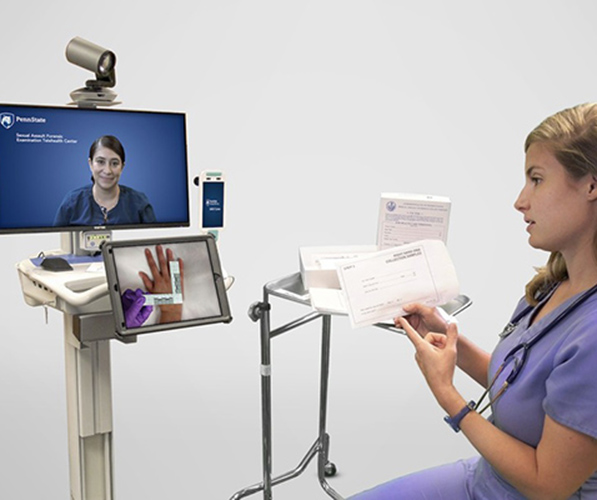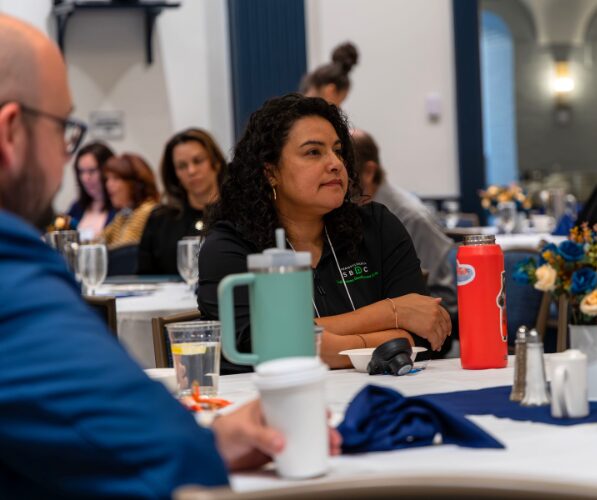Success Story
Knocking Down the Barriers to Healthcare for Rural Sexual Assault Victims
There are more than 284,000 victims of sexual assault across America every year. Victims require timely, skilled, and compassionate healthcare to address injuries, risk of pregnancy, and sexually transmitted infections. Additionally, forensic evidence must be collected accurately and methodically to aid in the successful prosecution of perpetrators. Current technology used to aid in magnification, image capture, and secure storage is expensive and requires substantial technical expertise to administer.
Unfortunately, most U.S. hospitals lack both the adequate equipment to photo-document evidence of assault and the needed expert sexual assault health care providers; nor do they have access to peers who can review findings. In these underserved settings, providers either use hand-held cameras without magnification or forego photo-documentation completely, resulting in inadequate evidence for successful prosecution of perpetrators.
The Penn State College of Nursing’s SAFE-T Center team, led by assistant professor and center director Sheridan Miyamoto, is working to combat this healthcare challenge with their new telehealth solution, the SAFE-T System. Currently, the SAFE-T Center pairs existing commercial products with custom telehealth solutions and extensive added security protections and deploys the technology suite to rural partner hospitals, enabling a local nurse and victim to receive assistance from an off-site expert, a sexual assault nurse examiner (teleSANE), in real-time, as if the expert were present in the room. The technology also has the ability – with the patient’s consent – to enable the on-site nurse to talk with an on-screen forensic nurse, and together, they support the patient. The teleSANE can also see the live exam in progress to ensure compassionate, person-centered care is delivered and evidence collection adheres to best practices.
SAFE-T System – the next generation, improved visualization and telehealth device, and platform – will provide better visualization of injuries and allow for enhanced security during these sensitive exams at a substantially reduced cost. Miyamoto believes providing nurses with mentoring, live-guidance and advanced telehealth equipment will provide sexual assault victims with enhanced confidence in their care, a first step toward healing.
Miyamoto launched her healthcare career in 1997 as a nurse practitioner in a rural California community clinic where she began providing care to children who had been sexually abused. Her experiences revealed that very few healthcare professionals are trained to work with sexual assault victims and inspired her idea to use telehealth and technology to assist rural community hospitals in providing quality care for sexual assault victims.
More than a decade later, and a year into her Penn State teaching and research career in the College of Nursing and in the Child Maltreatment Solutions Network, Miyamoto received a $4.1 million grant from the U.S. Department of Justice Office for Victims of Crime that helped establish the SAFE-T Center in 2016.
“The SAFE-T Center is rooted in the philosophy that no matter where victims of sexual assault live, they should be able to access expert care,” says Miyamoto. “And no matter where nurses work, they should have the support of a network of experts when treating sexual assault victims.”
With funding for the Center, Miyamoto was beginning to realize her dream, but developing a scalable healthcare solution for such a complex problem is no easy feat, and she’d need help from Penn State’s entrepreneurial ecosystem. First, she began working with the Penn State Office of Technology Management to help characterize, classify, and protect the intellectual property associated with SAFE-T System. Then she was accepted into the Fall 2019 Ben Franklin TechCelerator @ State College. Then she competed in the 2019 Invent Penn State Venture & IP Conference Tech Tournament in October and won 3rd place and $25,000.
At each stage, Miyamoto and her team received significant support. She cites Penn State’s Startup Leadership Network as being particularly helpful. The program pairs Penn State startups with industry experts, C-Suite management, and serial entrepreneurs who can help them advance their business and achieve milestones like clearing hurdles for proof-of-concept, product testing, and regulatory approvals.
Today there are seven partner sites utilizing SAFE-T SCOPE technology and SAFE-T Center healthcare consultants, including: UPMC Lock Haven; UPMC Williamsport; Penn Highlands Dubois; Penn Highlands Huntingdon; Clarion Hospital; and the Penn State Health Milton S. Hershey Medical Center, in Hershey, PA.
To date, the SAFE-T Center has received 75 calls, resulting in 58 telehealth assisted forensic sexual assault consultations. Calls that didn’t result in a consultation resulted in advice being given or were instances of the assault having occurred outside the window for evidence collection, meaning this type of an examination wasn’t warranted. This data comes largely from the first three partner hospitals as the last four sites were only recently added.
“SAFE-T System is a unique product and platform attempting to solve an important health care challenge,” says Jim Pietropaolo, who heads the Startup Leadership Network Program and is the Associate Director for the Office of Entrepreneurship and Commercialization. “Sheridan Miyamoto and her team are doing promising work, and we are supporting them in every way we can.”






